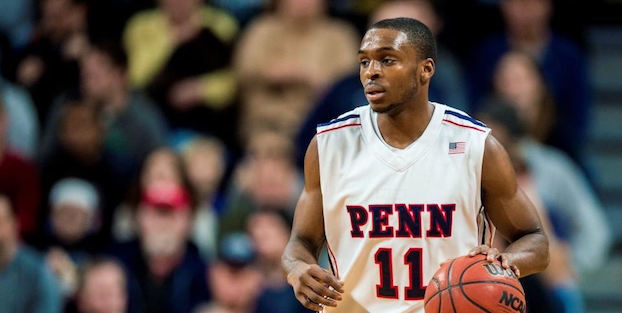For those familiar with the city of Philadelphia, it’s no secret that Drexel University and the University of Pennsylvania are close to one other. The two schools are neighbors, in fact — just a short three-block walk down 33rd or 34th Streets. As a result, students from the two schools often wind up becoming friends.
Such was the case with two of the top men’s basketball players at the two programs — Damion Lee at Drexel and Tony Hicks at Penn. A pair of potent scoring guards, Lee became one of the top mid-major players in the country over at Drexel, while Hicks was emerging as Penn’s leading scorer in both his sophomore and junior years, torching the nets at the famed Palestra, the Quakers’ home floor.
Lee and Hicks got to know each other, hanging out around their nearby campuses. Both were city kids — Lee from Baltimore, Hicks from Chicago – and they grew into fast friends. So when Louisville needed to find Lee’s replacement from the graduate transfer ranks, it wasn’t too difficult a sell for Rick Pitino to convince Hicks to make his way to the Derby City for his final collegiate season.
A Chicago native who starred at St. Rita High School, Hicks signed with Penn out of the 2012 class. During his time at St. Rita, Hicks was named Catholic League Player of the Year and led his school to a state championship.
Hicks came in and made an immediate impact as a freshman for the Quakers in 2012-13, averaging 10.4 points per game while shooting 81 percent from the free-throw line. He was named Ivy League Rookie of the Week back-to-back in late February and early March after scoring 22 points or more in four of Penn’s last seven games, including a season high of 29 points against Cornell. Hicks was named honorable mention All-Ivy League for his efforts.
Following his breakthough rookie year, Hicks had an up-and-down sophomore season at Penn, scoring 28 points in the season opener against Temple and then dropping 33 points a couple weeks later against Niagara. But as the losses mounted for the Quakers in an eventual 8-20 season, Hicks’ production was sporadic.
Though Hicks would have six games with 23 or more points, he had six other games in which he failed to score in double digits. His scoring improved to 14.9 points per game, but his three-point shooting percentage dropped considerably, from 35.5 percent his freshman season to 31.9 percent as a sophomore.
Hicks returned to Penn as a junior in 2014-2015 and earned his second honorable mention All-Ivy recognition, averaging better than 13 points and 3.5 rebounds an outing. His three-point shooting improved significantly, bumping up to 37.1 percent, while he also improved defensively, averaging just under a steal a game. But after enduring a 9-19 season at Penn — his third straight losing season as a member of the Quakers — Hicks was ready to move on to a more successful program for his final year of eligibility.
Making the decision to preemptively sit out the 2015-16 season while completing his undergraduate degree at Penn — he’s on track to graduate in May — Hicks began to consider alternative options.
He made the decision to attend Louisville just after the first of the year. What are reasonable expectations for the 6-2 guard going into next season? Get access to the rest of this article and unlimited access to the rest of ACCSports.com when you upgrade to Premium Access! Click on the button below to view all the benefits of becoming a Premium Access member.Get the rest of the story right now with Premium Access!
Premium Access members receive:

















